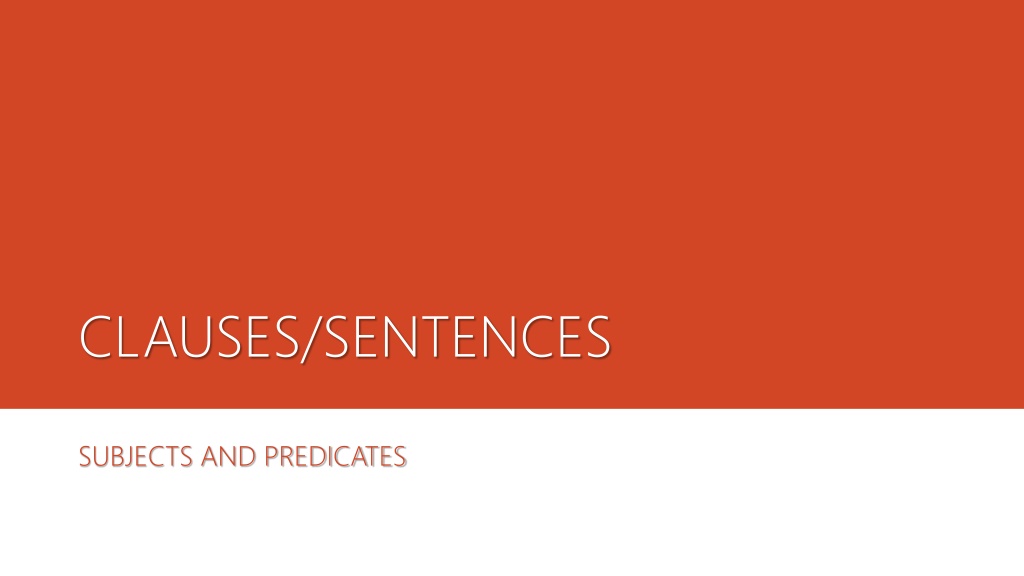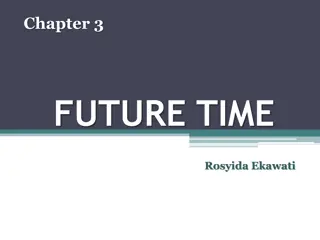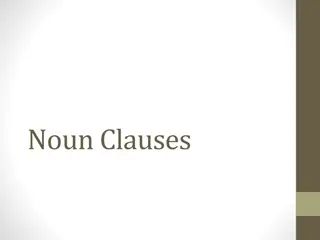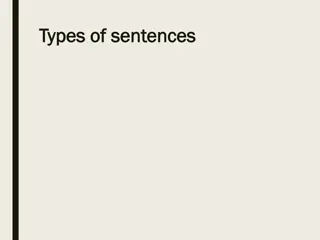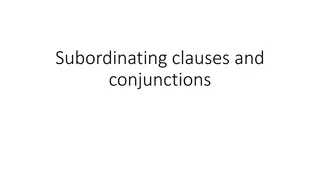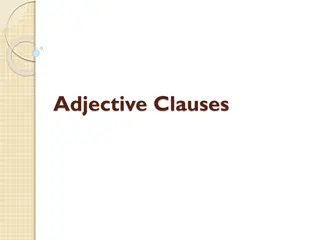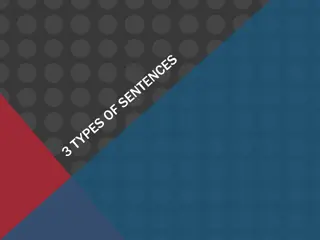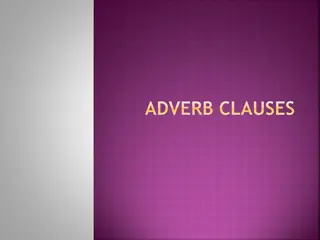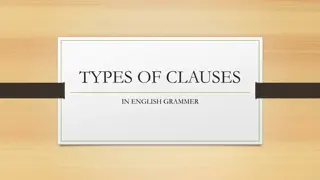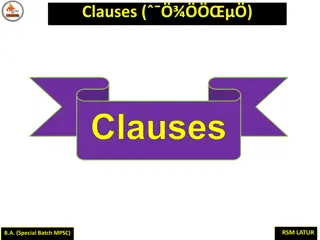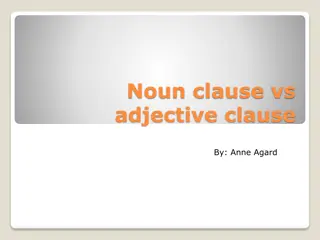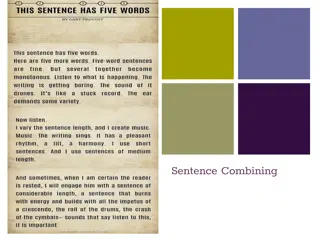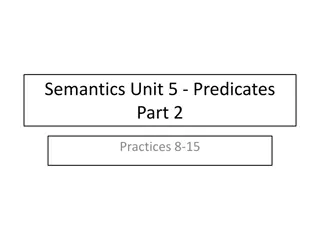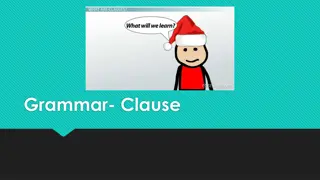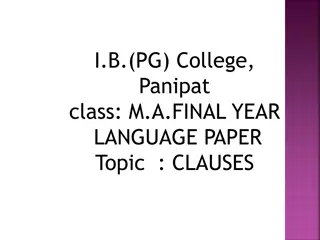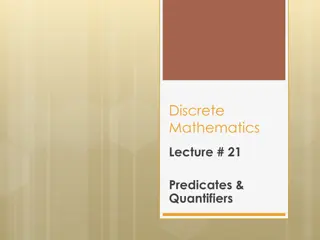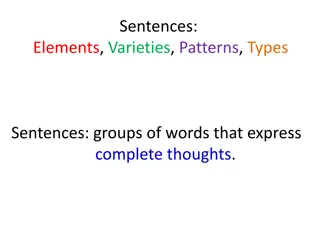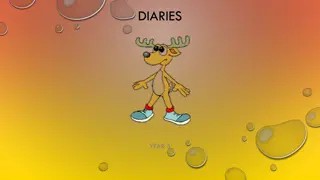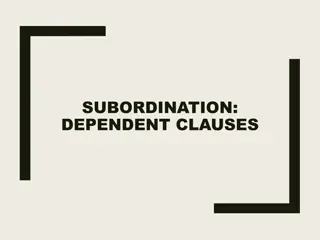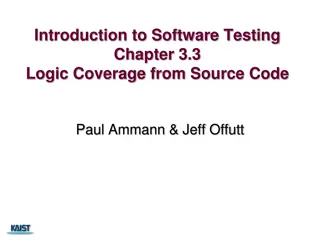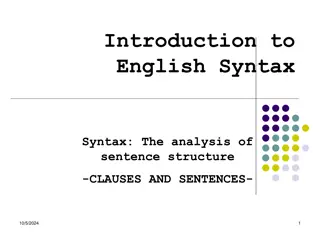Understanding Clauses, Sentences, Subjects, and Predicates
Learn about the essentials of clauses, sentences, subjects, and predicates through examples and explanations. Understand the importance of having a subject and verb in a sentence, identifying fragments, and connecting dependent and independent clauses. Enhance your knowledge of grammar fundamentals.
Download Presentation

Please find below an Image/Link to download the presentation.
The content on the website is provided AS IS for your information and personal use only. It may not be sold, licensed, or shared on other websites without obtaining consent from the author. Download presentation by click this link. If you encounter any issues during the download, it is possible that the publisher has removed the file from their server.
E N D
Presentation Transcript
CLAUSES/SENTENCES SUBJECTS AND PREDICATES
o A written sentence needs a a subject grammatical. (A sentence may be composed of one or more clauses.) subject and and a a verb verb to be SENTENCES o A spoken sentence needs a complete thought and may rely more heavily on contextual information.
CLAUSES AND SENTENCES CLAUSES AND SENTENCES - - SUBJECTS AND PREDICATES SUBJECTS AND PREDICATES We had a wonderful time there. In fact, great! Fragment no subject or verb a. We had a wonderful time; in fact, it was great! Add a subject, verb and punctuation. b. We had a wonderful time there. In fact, it was great! c. We had a wonderful. In fact, a great time there.
CLAUSES AND SENTENCES CLAUSES AND SENTENCES - - SUBJECTS AND PREDICATES SUBJECTS AND PREDICATES He crashed his car. texting and not paying attention. a. He crashed his car because he was texting attention. Because he was and not paying Fragment because marks the clause as a dependent dependent clause needs to be attached to an independent clause to be a sentence. the adverb b. Because he was texting and not paying attention, he crashed his car. clause. A Join the dependent clause to the independent clause. Use a comma to separate the clauses only if the sentence begins with the adverb clause.
CLAUSES AND SENTENCES CLAUSES AND SENTENCES - - SUBJECTS AND PREDICATES SUBJECTS AND PREDICATES Put the book there. On my desk. Fragment no subject or verb Add the prepositional phrase with a comma as it restates there. a. Put the book there, on my desk.
CLAUSES AND SENTENCES CLAUSES AND SENTENCES - - SUBJECTS AND PREDICATES SUBJECTS AND PREDICATES Subject: a noun or pronoun that takes the predicate. Predicate: everything that is not part of the subject. Clause: a subject and a predicate working together.
CLAUSES AND SENTENCES CLAUSES AND SENTENCES - - SUBJECTS AND PREDICATES SUBJECTS AND PREDICATES She ate the donuts. S P (one clause) It is cold in the classroom, but it is hot in the hall. S P S P (two clauses)
PRACTICE PRACTICE - - Read and analyze the passage. Circle the predicates and underline the subjects in the sentences and separate the clauses. My sister and I were at my grandma's house when the phone rang. We were watching TV and eating sandwiches. It was Jan, and she wanted to talk to my sister. Jan told my sister that the new super group, the Dance Boys, was at the mall. My sister almost fainted because she's the biggest fan of the Dance Boys. When we got there, the mall was packed with Dance Boy fans. While the Dance Boys sang, Jan danced. I played games on my cell phone because I hate them. If Jan, my sister, and I go to the mall again, I'll surely walk around and shop.
